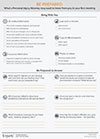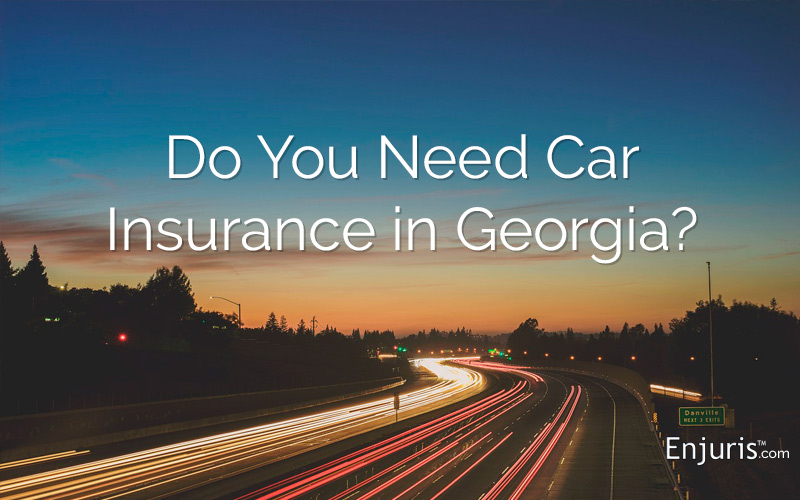Everything you need to know about Georgia’s minimum car insurance coverage requirements
Whichever kind of vehicle you drive in Georgia, all motorists are required to purchase insurance. This article identifies what coverage is required, what is optional, and what to know about insurance claims in an accident.
Auto insurance coverage requirements in Georgia
According to §40-6-10 of the Georgia code, all drivers and motorcyclists are required to possess “Vehicle Liability Insurance Coverage.” Insurance requirements are the same for all motor vehicles in Georgia, and provide compensation to the other party should you cause an accident. Thus, whether you own a car, truck, van or motorcycle, you must have the following insurance coverage:
- $25,000 bodily injury liability for one person;
- $50,000 bodily injury liability for all involved in the accident; and
- $25,000 property damage liability.
Bodily injury coverage provides compensation for the medical bills and lost wages of the accident victim. Additionally, this coverage covers the legal fees connected to personal injury lawsuits.
Property damage coverage provides compensation for bills connected to the victim’s repairs and rental car fees, if needed. Additionally, this coverage assists with damaged property such as mailboxes, store fronts, or any item or building affected by the accident.
Penalties for lacking insurance in Georgia
Violating Georgia’s insurance law has hefty penalties. The State of Georgia assigns the following consequences for driving without insurance:
For a first offense:
- A license and registration suspension for at least 60 days
- Up to 1 year of jail time
- Over $200 in fees to reinstate your license
For a second offense:
- A license suspension of at least 90 days
- Up to 1 year of jail time
- Over $300 in fees to reinstate your license
It’s important to note that penalties apply whether you lacked insurance or you let it lapse. Lapsed insurance has smaller reinstatement fees, but the other consequences remain the same.
Another important insurance concern is that you must be able to provide proof of your auto insurance coverage. Your insurance card must be carried with you at all times while driving. If you’re charged with lacking proof of insurance, you have a 30-day grace period to provide proof of coverage. You will still pay a fine of $25 for not having the card with you, but the charge will be dropped.
Optional insurance coverage plans and what they cover
The above coverage are those required by law, but they don’t offer you any compensation in an accident. In other words, the coverage discussed above only helps the other party should you cause the accident.
Below are some additional insurance options that you can add to the mandatory minimum coverage in order to give yourself more of a financial cushion in the event of an accident:
- Collision coverage– This coverage is for your vehicle and reimburses you for the cost of repairs, minus the deductible. You don’t have to choose an amount for collision coverage. Instead, this coverage will cover the total cash amount of your vehicle prior to the accident.
- Comprehensive coverage– This insurance isn’t for accidents. Nevertheless, this coverage protects you should your car or motorcycle be vandalized, stolen, or damaged in a non-highway accident such as bad weather.
- Uninsured coverage– Arguably the most important additional insurance, this coverage provides compensation for your medical bills, lost wages and damages connected to emotional harm if the other driver had no insurance or you’re in a hit and run accident.
- Underinsured coverage– This insurance coverage provides an additional safety net for motorcyclists and drivers. Many car and motorcycle accidents cause catastrophic injuries, especially in drunk driving or truck accident cases. Accordingly, the coverage that the other party has may not be enough to compensate you for all of the physical and emotional harm you suffered. Thus, an underinsured coverage option provides an extra layer of financial protection for you to cover the extra costs.
All too often, Georgia drivers lack the appropriate insurance coverage. In many cases, the driver lacks the finances to pay for insurance. If this is the case, the driver may also be indigent or incapable of paying damages in a personal injury lawsuit. Thus, uninsured coverage may be the only way to recover compensation for motorcycle or auto accidents.
It’s important to note that underinsured and uninsured coverage also applies to cases where you weren’t in your vehicle. Injuries and expenses from pedestrian accidents and bicycle accidents may be covered by these insurance options.
A brief overview of insurance settlements vs personal injury lawsuits
Insurance coverage is typically the best compensation should a fender bender or other minor accident occur. If your injuries weren’t serious and you car damage was minimal, relying on an insurance settlement is likely your best option as it will provide the necessary compensation.
Other times, however, your bills are much higher than the coverage required by law. If, for example, your medical bills and lost wages amount to $100,000, the other driver’s insurance will only pay you $25,000 if that’s the driver’s maximum coverage. To recover the additional $75,000, your only option is to pursue a personal injury lawsuit.
Fault is an issue in many accident claims. An insurance company may try to assign you a high percentage of fault, reducing their payment to you. Georgia law requires you to be less than 50% at fault in order to receive compensation in a personal injury claim. An experienced accident attorney can help you prove that you’re still eligible for compensation.
Lastly, if you’re overwhelmed by the insurance process or need help with the forms and documentation, there’s no reason to avoid consulting with an attorney. Consultations are typically free, and a short visit can help put your mind at ease.
Download and print these free resources to get prepared for your first consultation:

A worksheet to prepare for your first meeting with a personal injury attorney – what to bring, what they'll ask
Download in PDF format

Worksheet with questions to ask a personal injury attorney to help determine if he or she will be a good fit for your case
Download in PDF format
If you feel you would like the assistance of a legal expert to help you navigate the consequences of your accident, browse Enjuris’ list of Georgia personal injury attorneys.
Additional Resources
Insurance coverage and claims are confusing. In order to help accident survivors, Enjuris offers these additional resources concerning insurance and accidents:
- Dealing with insurance claims adjusters
- Tactics insurance adjusters may use
- Steps to an insurance claim settlement
- Personal property damage in an auto accident
See our guide Choosing a personal injury attorney.


